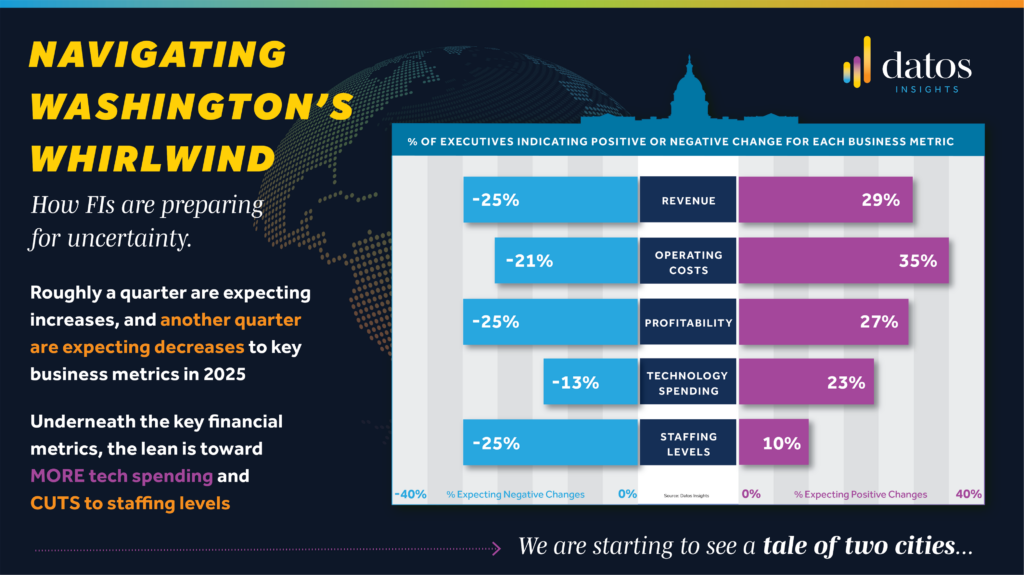Financial institution (FI) executives across the U.S. are getting nervous in the face of recent disruptions from Washington, D.C. Recent conversations with Datos Insights clients reveal how executives are responding to these challenges and offer insights into the divergent approaches emerging across the financial services industry.
Regulatory Disruption Creates Widespread Impact
A recent Datos Insights survey reveals that approximately 50% of FI executives see substantial impact from business disruption related to regulatory uncertainty. This feedback comes in client inquiries to the Datos Advisory team, too. For instance, the ongoing situation with the Consumer Financial Protection Bureau has placed FIs in a state of uncertainty. Executives must not only manage current rapid regulatory changes but also anticipate potential regulatory shifts that might occur two to four years in the future.
Further complicating matters is how Washington’s changing priorities create conflicting regulatory mandates for FIs. The “debanking” discussion is a prime example of these tensions. FIs typically distance themselves from certain customers due to anti-money laundering concerns. However, the growing enthusiasm around cryptocurrency introduces several financial crime considerations, placing FIs in the challenging position of balancing compliance objectives with evolving demands.
Customer Indecision Amplifies Challenges
Beyond regulatory concerns, 46% of Datos Insights clients in the same survey report moderate to extreme impact on their business from hesitation in customer decision-making. This delay directly affects revenue forecasts and growth projections. The combined effect of regulatory uncertainty and customer hesitation creates a challenging business environment that requires careful navigation and strategic adaptation.
FIs Split on Budget Strategies and Business Outlook
Budget and technology priorities are shifting in response to these changes, though not uniformly: 56% of Datos Insights clients surveyed have not yet implemented budget freezes, but 38% currently report being heavily impacted by such measures. This divergence may partly be a result of the rapid changes; more executives may feel the budget impact in the months ahead.

At the same time, this split reflects very different expectations about their businesses. Not all businesses are affected by these changes in the same way, and some clearly see opportunity. About a quarter of executives anticipate increases in key business metrics for 2025, while a similar proportion expect decreases:
- 29% expect revenue increases, while 25% anticipate decreases
- 35% project rising operating costs, compared to 21% forecasting reductions
- 27% anticipate improved profitability, while 25% expect declining profitability
Despite these varied expectations, there are clear patterns in operational approaches. Those that anticipate change tend to lean toward increased technology investment and reduced staffing levels. Only 10% of surveyed executives expect to increase staff, while 25% anticipate cuts. Conversely, 23% plan to boost technology spending, with just 13% projecting tech budget reductions. These findings signal a recognition that with reduced staff, FIs must rely more heavily on technology and accelerate the pace of technology implementation to navigate through current challenges.
AI Emerges as a Critical Multidimensional Solution
FIs are increasingly turning to artificial intelligence (AI) as a strategic response to current market challenges, according to the same survey. AI’s role has evolved from an experimental technology to an essential enabler across the whole FI business.
Customer experience stands out as a compelling driver, with 85% of executives identifying it as a significant motivator for AI implementation. More telling still, 60% classify it as very or extremely significant. In an environment where customer hesitation and regulatory uncertainty threaten business stability, institutions recognize that AI-enhanced customer experiences provide a critical competitive advantage that can help weather current market disruptions.
Risk management capabilities are central to FIs, and 60% of surveyed executives view business risk management as a significant motivator for AI adoption. Perhaps most revealing in the current climate of divided budget outlooks is AI’s role in productivity enhancement: Over 80% of surveyed executives identify productivity as a significant motivator for AI implementation, particularly for streamlining operations and reducing operational costs. This finding aligns precisely with the broader industry trend toward technology investment coupled with staffing reductions, as some institutions seek to maintain operational excellence with fewer human resources.
The path forward requires resilience and adaptability—qualities that have long characterized the most successful FIs during periods of significant change. Register for our upcoming Datos Situation Room, Navigating the Turbulent Waters of Crypto to gain critical insights on the volatile intersection of banking and digital assets alongside industry experts.

